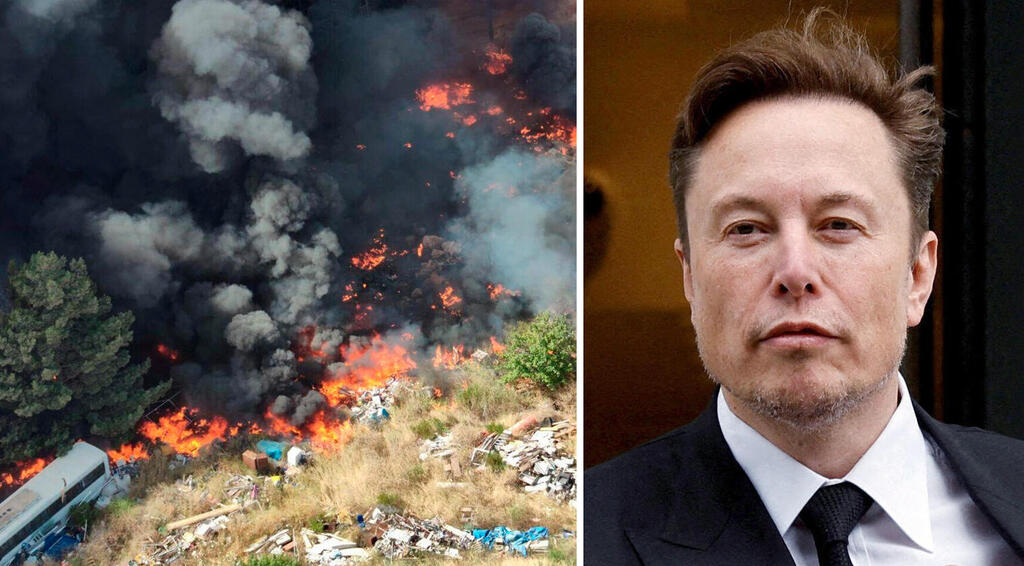
Analysis
In Musk we trust: Can Israel truly rely on Starlink in an emergency?
Israel is exploring the possibility of using the Starlink satellite communications network as an emergency backup in the event of a collapse of traditional communications systems. While it seems like a perfect solution, there is no certainty that Musk will not disable access to the system precisely at the most critical moment during a war in the North. This concern is heightened by the fact that Musk does not always make decisions in a calculated way or with reasonable motives.
On Tuesday, it was revealed in Calcalist that Israel is examining the possibility of using Elon Musk's Starlink satellite communication network as an emergency backup in the event of the collapse of traditional communication systems, such as during a war with Hezbollah. On the surface, this appears to be an ideal solution: satellites cannot be disabled by missiles, they remain operational even during widespread power outages or extensive destruction of infrastructure like cellular antennas, and all that is needed to connect to them is a relay station and a small generator for energy supply. However, this reliance on Starlink could be a dangerous mistake. Not because of the system itself, but because of who controls it – Musk, who can, with the push of a button and without any oversight, disable access to the system in wide geographical areas, as he has done before. Often, his decisions are not based on strategic calculation but rather on momentary impulses, sometimes in response to social media pressures and calls.
As Calcalist reveals, the ministries of finance and communication are currently examining the possibility of using Starlink in a scenario where the internet is disrupted or shut down following a war in the north. "The goal is for every war room in a government office to have Starlink backup to ensure functional continuity in an emergency," said a source privy to the details.
The first Starlink satellites were launched into space in 2019, and new satellites are launched almost every week. Today, Musk has more than 5,000 active Internet satellites in orbit around the Earth, more than 50% of all satellites, providing satellite connections to about 60 countries. The system has already proven its durability and usefulness in combat scenarios, such as the Russia-Ukraine war. It is reliable, available in extreme scenarios, and can be a game-changing tool. In Ukraine, for example, it has been used to guide drones, target artillery, and establish communication between headquarters and field forces. The problem lies not with the system, but with its absolute ruler: Musk.
According to a report by the New York Times from last year, Musk can decide on his own whether to cut off access to Starlink for a customer or a country. In a biography of Musk by Walter Isaacson, published last September, it was revealed that Musk actually did this. According to the biography, in 2022 Musk prevented an attack by Ukraine on the Russian fleet off the coast of the Crimean peninsula by blocking Starlink in the area, thus preventing the operation of military drones that relied on the satellite connection for their operations.
“Starlink was not meant to be involved in wars. It was so people can watch Netflix and chill and get online for school and do good peaceful things, not drone strikes,” Musk is quoted as saying in the book. Musk confirmed the details and wrote on X (formerly Twitter) that if he had allowed the connection, Starlink "would be explicitly complicit in a major act of war."
In the event of a war in the north, Israel has no certainty that Musk will not decide that this is a "major act of war." and eliminate access to the system at the most critical moment. This concern is heightened by the fact that Musk himself does not always make decisions in a calculated way or with reasonable motives. Since he completed the purchase of X more than a year and a half ago, Musk's capricious management style has been repeatedly exposed, often including decisions made on the spur of the moment, without sufficient consultation, or on an emotional basis. Sometimes, Musk is influenced by social media pressures. This was discovered by the Israeli identity verification company AU10TIX this month.
After anti-Israel users on X discovered that it provides services to the platform, they launched an online campaign calling on Musk to cut ties with the company, falsely claiming that information it receives from users would end up in the hands of Israel's intelligence services. Musk, who knows the company and approved its continued work with X after acquiring it, could and should have rejected the demands outright or simply ignored them. Instead, he promised: "We will investigate."
In other cases, Musk made decisions based on polls he conducted on Twitter. For example, he started unblocking accounts of users suspended from X for incitement, racism, or spreading lies after a survey he conducted in November 2022 supported this policy. In December of that year, he conducted a survey on whether he should retire from the position of CEO of X. The users voted by a clear majority for his retirement, and so he did in the end. A scenario in which Musk conducts a survey on X about whether to allow Israel access to Starlink in wartime is not the most far-fetched thing imaginable for him.
Musk may not be anti-Semitic, but he is also apparently not anti-anti-Semitic. Since acquiring X, he has brought back, encouraged, and embraced extremist users, including Israel haters, giving them a platform to spread their messages and sometimes also echoing them himself. Among other things, he stated that an anti-Jewish tweet was "truth," said that billionaire George Soros "hates humanity," and led a well-publicized smear campaign against the Anti-Defamation League.
Is this the person in whose hands we are asking to entrust Israel's emergency communications? Does the State of Israel really want its communications capability during an emergency to be in the hands of one person who has the absolute ability to block the system's activity, who has already done so in the past during wartime, who has shown affection or understanding for anti-Semitic or anti-Israeli positions and conspiracies, and who sometimes makes decisions based on motives that are not rational and in response to pressure from Internet users? In other words, does Israel want a poll on X to determine whether it will win the war against Hezbollah? Because this may be the case if it is decided to adopt Starlink.














